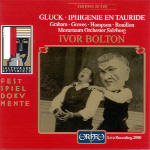This opera was considered a discographic rarity until the last few years, when Martin Pearlman’s and Mark Minkowski’s period-instrument readings were added to Muti’s and the one starring Callas, from La Scala in the ’50s, both of which use modern forces. Both Pearlman and Minkowski offer thrilling readings and each of their recordings is highly recommended. Now entering the sweepstakes, and splendid indeed, is this live-from-Salzburg-2000 performance led by Ivor Bolton. Bolton knows his early music and here he uses a modern-instrument ensemble, but with period brass, swift tempos, and almost no vibrato.
Purists will not balk at his choices: this is music-making of the first order. And the fact that this performance is being played out in front of an audience adds an extra punch to the drama. Susan Graham’s Iphigenie is almost in a class with Goerke’s (for Pearlman), which is pretty high. The voice is dramatic and the seriousness of her plight is never in doubt, but Goerke brings a bit more nobility to the role. Thomas Hampson’s Orestes is probably the best work I’ve ever heard him do in opera: I find his Verdi too light and his Mozart forced. Here he captures every nuance of this confused, conflicted character, and when he rages and goes practically mad, he sounds truly tormented. (It is one of the few places in the score where Bolton allows real vibrato, for both singer and players.) Hampson’s competition (especially Simon Keenlyside) is strong, but he wins.
Pylades is a role that tends to pale beside Orestes, and Paul Groves sings it beautifully, certainly outclassing Vinson Cole for Pearlman. Philippe Rouillon is suitably gruff as Thoas and the rest of the cast is as good as anyone would want. The Mozarteum Orchestra responds beautifully and plays with veristic passion and Classical poise. You can’t go wrong with this recording–or with Pearlman’s either. And Minkowski’s is not very far behind.
































